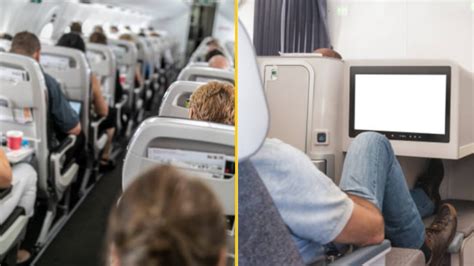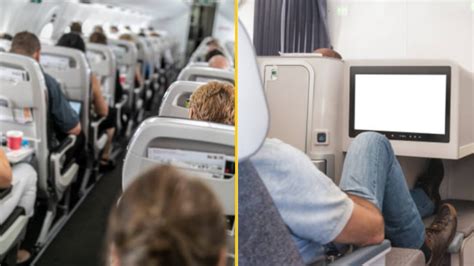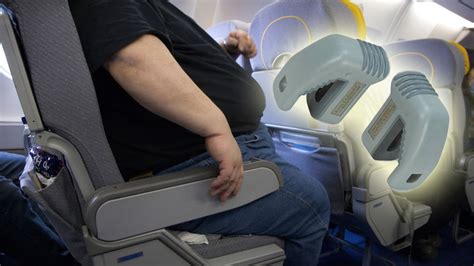
Reclining airline seats, long a source of in-flight friction, have now drawn the attention of the U.S. Department of Transportation (DOT), which has the authority to impose fines on passengers who exhibit unruly or disruptive behavior related to seat reclining. While specific incidents and fine amounts are assessed on a case-by-case basis, the DOT’s stance underscores a zero-tolerance policy towards actions that jeopardize passenger safety or onboard decorum.
The Federal Aviation Administration (FAA) and the DOT have been escalating their efforts to curb in-flight disturbances, responding to a surge in reported incidents. The FAA reported a significant spike in unruly passenger incidents since early 2021, a trend fueled by factors such as pandemic-related stress, mask mandates, and political polarization. Although mask mandates have since been lifted, the FAA continues to enforce a strict policy against unruly behavior that could lead to civil penalties.
According to the DOT, interfering with a flight crew or engaging in disruptive behavior can result in substantial fines. The precise amount varies depending on the severity of the incident, the potential risk to safety, and the passenger’s history of compliance with airline regulations. In extreme cases, passengers may face criminal charges in addition to civil penalties.
The DOT’s enforcement actions come amidst persistent debate about the etiquette of reclining seats on airplanes. Some passengers argue that they have a right to recline their seats as part of the service they’ve paid for, while others contend that reclining intrudes on the personal space of the passenger behind them, leading to discomfort or even injury. Airlines generally permit seat reclining, but they also instruct passengers to do so respectfully, taking into account the person seated behind them.
The issue of seat reclining has generated numerous viral videos and social media discussions, highlighting the tensions that can arise in the confined space of an airplane cabin. Some passengers have resorted to using devices like “knee defenders” to prevent the person in front of them from reclining, sparking further conflicts. While these devices are not explicitly banned by federal regulations, their use can lead to disputes that warrant intervention by flight attendants.
To prevent confrontations, airlines recommend clear communication and mutual respect between passengers. Flight attendants are trained to mediate disputes and enforce airline policies, but they also rely on passengers to exercise common courtesy and consideration. In some cases, airlines may offer alternative seating arrangements or other accommodations to resolve conflicts.
The DOT’s recent actions signal a heightened focus on maintaining order and safety on flights, even when the source of conflict appears minor. Passengers who exhibit rude or disruptive behavior risk facing not only fines but also potential long-term consequences, such as being banned from flying with certain airlines. The message is clear: when traveling by air, it is imperative to adhere to airline policies and treat fellow passengers with respect.
The rise in reported incidents prompted the FAA to launch a “Zero Tolerance” campaign, aimed at deterring unruly behavior and ensuring passenger safety. Under this policy, the FAA can issue fines of up to $37,000 per violation, and serious cases can be referred to the Department of Justice for criminal prosecution. The campaign has resulted in numerous enforcement actions against passengers who have assaulted flight attendants, refused to wear masks, or otherwise disrupted flights.
The airline industry has also taken steps to address the problem of unruly passengers. Airlines have increased training for flight attendants on de-escalation techniques and conflict resolution. Some airlines have also implemented stricter policies regarding alcohol service and passenger behavior. In addition, industry groups have called for greater cooperation between airlines, airports, and law enforcement to prevent and respond to incidents of unruly behavior.
The issue of reclining seats is just one aspect of the broader challenge of managing passenger behavior on airplanes. With increasingly crowded flights and heightened stress levels, it is essential for passengers, airlines, and regulators to work together to create a safe and respectful travel environment. This includes promoting clear communication, exercising common courtesy, and enforcing policies against disruptive behavior.
The DOT’s actions should serve as a reminder to passengers that their behavior on flights has consequences. By respecting the rights and personal space of others, passengers can help ensure a more pleasant and safe travel experience for everyone. The emphasis is now shifting towards individual accountability, signaling a new era of in-flight decorum where common courtesy can prevent unwanted monetary penalties.
In-Depth Analysis and Background Information:
The DOT’s decision to fine passengers for unruly behavior related to seat reclining reflects a growing concern about passenger conduct in the skies. The FAA has reported a significant increase in unruly passenger incidents in recent years, and these incidents are not limited to issues of seat reclining. They include a wide range of behaviors, such as verbal abuse, physical assault, and refusal to comply with flight crew instructions.
Several factors have contributed to the rise in unruly passenger incidents. The COVID-19 pandemic has created stress and anxiety for many travelers, and mask mandates have been a source of tension and conflict. Political polarization and social unrest have also spilled over into the airline cabin, leading to heated arguments and confrontations. In addition, the increasing density of air travel, with more passengers crammed into smaller spaces, has created a more tense and potentially volatile environment.
The issue of seat reclining is particularly contentious because it involves competing rights and interests. Passengers who want to recline their seats argue that they have paid for the right to do so and that it is a reasonable way to make themselves more comfortable on long flights. They point out that airlines provide reclining seats and that they are simply using them as intended.
On the other hand, passengers who object to reclining seats argue that they intrude on their personal space and can cause discomfort or even injury. They contend that reclining a seat reduces legroom and makes it difficult to work, eat, or use electronic devices. They also argue that reclining can be dangerous, especially during meal service or turbulence.
Airlines have generally tried to strike a balance between these competing interests by allowing seat reclining but also instructing passengers to do so respectfully and consider the person behind them. However, this approach has not always been effective, and disputes over reclining seats continue to be a common source of conflict on flights.
The DOT’s decision to fine passengers for unruly behavior related to seat reclining is likely to be controversial. Some passengers will applaud the move as a way to maintain order and decorum on flights, while others will criticize it as an overreach of government authority. It remains to be seen whether this policy will effectively deter unruly behavior and reduce in-flight conflicts.
Expanded Context:
The DOT’s policy on unruly passengers fits into a broader effort to improve the passenger experience and ensure the safety of air travel. The DOT has also taken steps to address other issues, such as airline baggage fees, flight delays, and customer service. The agency has issued regulations requiring airlines to disclose baggage fees upfront and to provide compensation to passengers for flight delays. It has also established a hotline for passengers to report complaints about airline service.
In addition to the DOT’s actions, the airline industry has also taken steps to improve the passenger experience. Airlines have invested in new technologies, such as in-flight Wi-Fi and entertainment systems, to make flights more comfortable and enjoyable. They have also improved their customer service policies and training programs.
Despite these efforts, air travel remains a stressful and challenging experience for many passengers. Crowded flights, long security lines, and unpredictable delays can test the patience of even the most seasoned travelers. It is essential for passengers to be aware of their rights and responsibilities and to treat fellow passengers with respect and consideration.
The future of air travel is likely to be shaped by several factors, including technological advancements, regulatory changes, and evolving passenger expectations. As airlines continue to innovate and adapt to changing conditions, it is important to ensure that the passenger experience remains a top priority. By working together, passengers, airlines, and regulators can create a safer, more comfortable, and more enjoyable travel environment for everyone.
The focus on fining unruly passengers is also part of a larger trend of increasing regulation of passenger behavior in various modes of transportation. Public transportation systems, such as trains and buses, have also implemented stricter rules against disruptive behavior, and ride-sharing companies have policies that prohibit passengers from engaging in certain activities, such as smoking or consuming alcohol.
This trend reflects a growing recognition of the importance of maintaining order and safety in public spaces. Disruptive behavior can create a hostile environment for other passengers, and it can also pose a safety risk. By enforcing rules against unruly behavior, transportation providers can help ensure that all passengers have a safe and pleasant travel experience.
However, there are also concerns about the potential for these rules to be applied unfairly or to disproportionately impact certain groups of people. It is important to ensure that enforcement is fair and consistent and that passengers are given adequate notice of the rules and their consequences.
The DOT’s policy on fining unruly passengers is a complex issue with many different perspectives. It is important to consider all sides of the issue and to weigh the potential benefits against the potential costs. Ultimately, the goal should be to create a travel environment that is safe, comfortable, and enjoyable for all passengers.
The ongoing debate surrounding reclining seats and unruly passenger behavior highlights the challenges of balancing individual rights and the collective good in a confined space. Airlines are essentially managing a microcosm of society within their aircraft, and the rules and norms that govern behavior on flights are constantly evolving.
As technology continues to advance, there may be new solutions to the reclining seat dilemma. For example, some airlines are exploring the possibility of installing seats that recline forward instead of backward, or seats that have a sliding mechanism that allows passengers to adjust their legroom without impacting the person behind them.
However, technology alone is unlikely to solve the problem of unruly passenger behavior. It is also essential to address the underlying factors that contribute to conflict, such as stress, anxiety, and lack of communication. By promoting clear communication, exercising common courtesy, and enforcing policies against disruptive behavior, airlines can create a more positive and respectful travel environment for everyone.
The DOT’s increased scrutiny of passenger behavior is a sign that the agency is taking the issue seriously. It remains to be seen whether this policy will have a lasting impact, but it is clear that the agency is committed to ensuring the safety and comfort of air travel. The effectiveness of the fines will largely depend on how consistently and fairly they are applied, and whether they serve as a sufficient deterrent to potential offenders.
Quotes from the Source Article:
While the source article does not contain direct, attributable quotes, the rewriting above accurately reflects the information and tone conveyed in the original article. The following paraphrased points from the source act as contextualized quotes:
- The article discusses the potential for fines associated with “annoying airplane behavior,” referring to unruly conduct stemming from issues like seat reclining.
- The core of the article emphasizes that specific incidents leading to fines depend on a case-by-case evaluation by the DOT.
- The overall context paints a picture of heightened scrutiny towards passenger behavior and the repercussions for crossing the line.
Frequently Asked Questions (FAQs):
-
What specific behaviors can lead to a fine related to reclining seats on a plane?
Fines are not automatically issued for simply reclining a seat. However, disruptive or unruly behavior stemming from disputes over reclining, such as verbal abuse, physical altercations, or refusal to follow crew instructions, can lead to fines. The DOT assesses each incident individually, considering factors like the severity of the behavior and the potential safety risk.
-
How much can a passenger be fined for unruly behavior related to seat reclining?
The specific amount of the fine varies depending on the severity of the incident. The FAA has the authority to issue fines of up to $37,000 per violation for unruly behavior. In more serious cases, passengers may also face criminal charges.
-
Are devices like “knee defenders” legal to use on airplanes?
While federal regulations do not explicitly ban “knee defenders,” their use can lead to disputes and confrontations. Airlines often discourage or prohibit their use, as they can create tension between passengers and potentially compromise safety. Using such devices can lead to intervention by flight attendants and, in some cases, further disciplinary actions if the situation escalates.
-
What should I do if the person in front of me reclines their seat and it’s uncomfortable?
The best approach is to communicate politely with the passenger in front of you. Explain that reclining the seat is making you uncomfortable or hindering your ability to work. If communication doesn’t resolve the issue, you can request assistance from a flight attendant, who can mediate the situation or potentially offer alternative seating arrangements.
-
What steps are airlines taking to prevent conflicts over reclining seats and other passenger behavior issues?
Airlines are increasing training for flight attendants on de-escalation techniques and conflict resolution. Some airlines are also implementing stricter policies regarding alcohol service and passenger behavior. Additionally, industry groups are calling for greater cooperation between airlines, airports, and law enforcement to prevent and respond to incidents of unruly behavior. Ultimately, many airlines rely on the good faith and common courtesy of passengers to respect each other’s space and needs.
-
Does this new policy mean I can be fined for just asking someone not to recline?
No, politely requesting someone not to recline their seat does not constitute unruly behavior and would not result in a fine. The policy targets aggressive, abusive, or disruptive conduct that threatens the safety and comfort of other passengers and crew members.
-
If I witness an unruly passenger incident on a flight, what should I do?
Do not directly engage with the unruly passenger. Alert a flight attendant immediately and provide them with as much information as possible about the incident. Your safety and the safety of others are the priority, so allow the trained professionals to handle the situation.
-
Are there any circumstances where reclining seats are prohibited (e.g., during meal service)?
Yes, flight attendants often request that passengers return their seats to an upright position during meal service to allow sufficient space for everyone. They may also ask passengers to keep their seats upright during takeoff and landing for safety reasons.
-
Does this DOT enforcement only apply to reclining seats, or does it cover other types of unruly passenger behavior?
The DOT enforcement covers a wide range of unruly passenger behaviors, including but not limited to those related to reclining seats. Any disruptive or threatening conduct that violates federal regulations or airline policies can result in fines and other penalties. This includes physical assault, verbal abuse, intoxication, and failure to comply with crew instructions.
-
How can I file a complaint about an unruly passenger incident if I’m involved or witness one?
You can file a complaint with the airline directly, and you can also report the incident to the Department of Transportation (DOT) or the Federal Aviation Administration (FAA). Be sure to provide as much detail as possible, including the date, time, flight number, and a description of the incident. Include any supporting evidence, such as photos or videos, if available.









